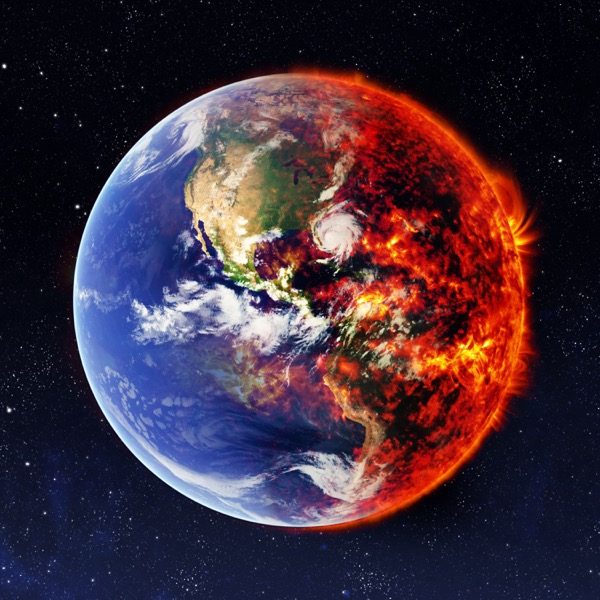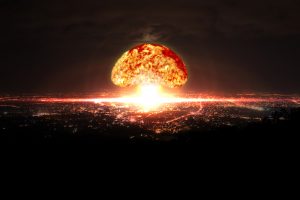
Naseer Habib, UK
The ark of civilization has now traversed thousands of years. Alongside immense scientific advancement whereby the human race has been able to view galaxies billions of light-years away and has harnessed the wild forces of small particles, we are simultaneously threatened by the worst form of danger. Atomic wars, relegated to being a mere sci-fi trope after the conclusion of the cold war, loom once more on the horizon of our collective fate. If they occur, which now seems more plausible than ever, then the human race is doomed to annihilation. The head of the Ahmadiyya Muslim Community, Hazrat Mirza Masroor Ahmad (aba) has sounded the alarm about this catastrophic threat and presented to the world’s leaders a set of principles that can be used as a solution. He has proposed a way forward based purely on the universal teachings of Islam. It can be summarised into eight key principles:
1. Know your Creator
It was, initially, the concept of God that laid the foundation of human civilization. Society, as it is today, was from its very outset divided into clans and tribes, but it was through the recognition of a Creator that man was able to rise above the parochial boundaries of family, clan and region and was able to establish civilization. [1] It was the recognition of a Creator that set the basis for civilization, and it is this very insight alone that will enable humanity to circumnavigate the multifaceted crisis that has ensnared us. Unless peace and harmony are sought through the recognition of the Creator, any other attempt will lead to the whole edifice of scientific achievement falling apart and ending in an unprecedented disaster. Now at this stage, man has forgotten his Creator and the relationship between man and God has grown cold. There is a spiritual vacuum everywhere and materialistic philosophies have taken over everywhere. As a result of this, severe atrocities are being perpetrated against humanity. Justice is callously denied. These atrocities and perpetrations of injustice put peace in jeopardy. Absolute justice is desperately needed.
2. Establish Absolute Justice
When the European powers were gaining ascendancy in the world, their religion was Christianity, which does not provide any moral advice about what to do in a war. Christianity commands that if anyone slaps you on the right cheek, turn to him the other also. No state can survive this way. Therefore, Europe turned towards thinkers like Machiavelli, who wrote in The Prince: ‘Machiavelli boldly declares that it is safer for a Prince to be feared rather than loved … Machiavelli steadfastly insists that violence and cruelty are necessary means of effective political action.’ [2] He also asserts that adopting virtue in every matter is to take an axe to one’s own survival. [3] Thus these concepts crept into international politics and became part of everyday life.
In the world of international politics, the idea of situational ethics was created, which holds that decisions should be based on keeping in mind the specific circumstances rather than on any universally applicable rules. In this void, the interests of the state took precedence over every moral principle and powerful nations started exploiting weaker ones. This attitude of injustice continued for a long time with various excuses. Before World War I , the process of globalisation was taking root quickly due to industrialisation and there were silver linings on the political horizon and statesmen seemed to be optimistic. In 1908, Winston Churchill said that the process of unity and harmony in the civilised world was moving on year by year and month by month. [4] It is also a proof of truthfulness of the Promised Messiah (on whom be peace) that when the prominent international leaders seemed to be optimistic that they would manage to keep things under control, the Promised Messiah (as) having received revelation from the All-knowing God, made an announcement in 1907, ‘Do you reckon that you will be safe from these earthquakes, or that you can save yourselves by your own machinations? Absolutely not … O Europe! You are not safe! And O Asia! Neither are you secure! And O the dwellers of Islands! No artificial ‘God’ will come to your aid.’ [5]
That One and Unique, who remained silent for a long time, revealed His countenance in an awe-striking manner and seven years after this announcement, the world was thrust into a horrible First World War which consumed the lives of 9 million soldiers and 10 million civilians. What ignited the First World War was the attitude of injustice and the atrocities which were committed by powerful nations against the weaker nations. The concept of social Darwinism was introduced into the realm of international politics. Social Darwinists argued that human societies were destined to compete for survival like species. ‘The British social theorist Herbert Spencer (1820-1903) believed that society should be established in such a way that the strongest and most resourceful would survive.’ [6] In the realm of international politics it was believed that, ‘all are equal but some are more equal than the other.’ Social Darwinists justified callousness toward the poor at home and toward imperial conquest abroad.’ [7] In light of this, the slogan gained extraordinary popularity that, ‘offence is the best defence.’ ‘This mindset helped to mould the offensive military doctrine which every European power adopted during 1892-1913.’ [8] The First World War was the culmination of this mentality of flagrant injustice and warmongering. The international leadership became alert and started thinking about establishing a League of Nations to avoid further catastrophe. The Qur’anic teaching appeared on the horizon like a pole star against this background of chaos and conflict and guided humanity towards peace and harmony. ‘And if two parties of believers fight against each other, make peace between them; then if after that one of them transgresses against the other, fight the party that transgresses until it returns to the command of Allah. Then if it returns, make peace between them with equity, and act justly. Verily, Allah loves the just.’ (The Holy Qur’an 49:10)
Thus in 1924, the Second Caliph (ra) of the Ahzmadiyya Muslim Community went to London to participate in the Wembley Conference. On this occasion, the secretary of the ethics committee of the League nations came to visit him. His Holiness (ra) called for justice according to the teachings of the Holy Qur’an and forewarned them that the League of Nations would collapse if all parties were not treated fairly. [9] Injustices resulting from the Treaty of Versailles provoked the Second World War, which devoured many tens of millions of lives. During the course of this war, it was the first time that an atomic bomb was dropped on the Japanese city of Hiroshima. On this occasion, the luckiest were those who were closest to the explosion site of the atomic bomb, since they died quickly. Those who were a little further away had to undergo indescribable agony.
The problem is that the big powers are still using double standards while confronting the problem of building peace in the world. In 2012, the Fifth Caliph and Worldwide Head of the Ahmadiyya Muslim Community, His Holiness, Hazrat Mirza Massroor Ahmad (aba) wrote letters to world leaders inviting them to participate in bringing about world peace and concord. While drawing their attention towards this noble cause, His Holiness (aba) also mentioned double standards practised by the big powers in these words, ‘It is undeniably true that the major powers act with double standards. Their injustices have caused restlessness and disorder to spread all across the world.’ [10] There is strong historical evidence that can be substantiated in support of this view that the big powers play double standards and perpetrate atrocities on weaker nations and, as a result of this, there is widespread restlessness and disorder in the world. Today, the whole world has stood aghast against the Russian attack on Ukraine. But a columnist Ed Vulliamy has raised a very pertinent point, ‘Ukraine matters, but so did Bosnia 30 years ago, where was the outcry then? … If we’d had a tenth of the public support for Ukraine, and a twentieth of the military support, the war would have been stopped, a hundred thousand lives saved; (says Damir Sagolj) … Most of the 100,000 dead and two million displaced in Bosnia were Slavic Muslims and some survivors think the West’s connivance was because they are just that – Muslims.’ [11] To move forward on the path of peace and stability, we will have to reject all religious and racial prejudice.
3. Foster Global Unity
Absolute justice is an essential prerequisite for creating international unity. Before the war of 1914-1918, five out of eight great powers had their roots in European soil and sixth, the Russian Empire, lay in the immediate neighbourhood of the European isthmus. [12] The supremacy of Europe in the world went hand in hand with the spread of Western civilization. However, every civilization has to confront challenges in the period of its ascendency but if it does not cope with these challenges successfully, then dark clouds are bound to gather on its horizon. At one stage Greek city states achieved tremendous success and needed to come out of the narrow boundaries of city states to form a greater alliance outside but they could not shake off the dead weight of their history. As a result of their failure, they had to withdraw from the world stage. In the same manner, in the 15th century, the city state of Florence emerged on the political horizon and achieved remarkable success in the field of trade and performed its role in the early renaissance but could not meet the demands of the coming era and was overtaken by nation states. As a result, the national states of Europe have made great strides in both politics and knowledge. They succeeded in casting their hegemonic net across the entire planet. But why does the sun now only occasionally appear when it once never set over the British Empire? The reason is that the institution of industrialisation is international in nature and requires the entire utilisable area of the planet. But in the words of Arnold J Toynbee, the European national states tried to pour new wines of industrialism and democracy into old bottles which burst the old bottles beyond repair. [13] Therefore, after the First World War, the ascendancy of Britain started receding and the process reached its culmination after the Second World War. After that, the countries with vast territories like America, Russia, and China began to advance. The European Union was to be formed but the national states of Europe were too late.
4. Seek Nuclear Disarmament
Nuclear disarmament is indispensable to the survival of humanity. The big atomic powers have an alarm system to cope with a nuclear attack but it sometimes gives false alarms. As is shown in the NORAD report, there has been an increase in these. Barbara Leonard and Bill Rosenberg estimate that, ‘if the United States and the Soviet false alarms increase 32.4 percent annually (as indicated by NORAD data) and if the warning time for both countries remains seven minutes, there is a high probability that a false alarm accidental nuclear war would occur within a decade.’ [14]
Even the thought of what havoc these weapons are capable of is utterly spine-chilling. ‘The atom bomb dropped on Hiroshima had an explosive power of 13 thousand tons … thirty-five years later, the total strength of nuclear arsenals is believed to be equivalent to some 13 billion tons of TNT, that is, one million Hiroshima bombs, or 3 tons of TNT for every man, woman, and child on the earth.’ [15] Any nuclear conflict started out of miscommunication could result in the extermination of the human race. If, God forbid, it happens, no one could summarise this human tragedy better than the renowned historian Arnold Toynbee: ‘if the ants and bees were one day to acquire even that glimmer of intellectual understanding that man has possessed in his day they might see the advent of the mammals, and the brief reign of the human mammal, as an almost irrelevant episode, full of sound and fury, signifying nothing. [16] There is no greater tragedy that can happen to people than this. May Allah provide man the ability to recognise his Creator so that he can avoid this wretched fate.
5. Eliminate Weapon profiteering
Big powers spend billions of dollars on military expenditures. ‘Sales of weapons and military services by the world’s 100 biggest arms companies reached a record $531bn in 2020.’ [17] The establishment of peace cannot be the priority of countries that export arms. In the 1980s, the Soviet Union and the US were the major suppliers of weapons to Third World countries.
Their total combined share was around 64 percent and the Middle East with a share of about 50 per cent of total Third World imports was the largest arms-importing region during 1981-85. [18] After that, things started getting worse in the Middle East. Yet, the presence of war and conflict serves the needs of significant arms manufacturers. A powerful international political institution is needed to control it. It requires a strong will, and this required will cannot be instilled without spiritual inspiration and motivation.
6. Create Economic Equity and Eradicate Poverty
In the past, many civilizations came into existence as a result of facing challenges and responding successfully to them. They took control of vast resources as a result. Ironically, they exhausted all of their precious resources on elites rather than providing aid to the underprivileged. Giving relief to the poor has never been on the agenda of the powerful elite. It is the right of every child to develop his potential to make a contribution in the field of knowledge, but this requires an economic system based on social justice, without which peace cannot be established. The world political elite needs to embrace an ecumenical strategy at this crucial time, putting aside its limited national and racial prejudices.
7. Work for the Good One’s Own Nation
Love for one’s country is part of faith. It is the duty of every person to perform his role for the promotion of peace and the welfare of his country. There is a query here. If a person considers that many people in his country have strayed from the right path by embarking on the path of religious intolerance and political fascism, then what should a person do? Here comes for our guidance, the golden paradigm illuminated by the footstep of the Holy Prophet (sa) and his companions. They underwent severe persecution in Mecca for 13 years but they never raised a weapon. They carried on their mission peacefully. When the atrocities became intolerable, they immigrated.
8. Instil service to Humanity
Two pillars serve as the foundation for Islamic beliefs; they are to show respect for the commandments of Allah and to love His creations. If a person does not express affection for humanity, it means that he does not hold respect for the commandments of Allah. It is mentioned in Haqaiq ul Furqan that one of the lords of Jammu fell ill and underwent all the treatment but in vain. Finally he got in touch with a Muslim saint. Money was sent to him, and he was called to Jammu. The Muslim saint refused to accept money and sent a reply saying, ‘It does not make any difference whether I pray for you in Ludhiana or Kashmir. The same God exists here and there. But the thing that does matter is whether you mete out fair treatment to your subjects; if not, they will pray against you so my prayer will not benefit you.’ [19]
Conclusion:
By presenting comprehensive principles, Hazrat Mirza Masroor Ahmad (aba) has invited the world to the abode of peace. Having manifested the radiance of Islamic teachings, the beloved Imam has sounded the divine alarm to alert us to the perilous dangers. Every Ahmadi has a responsibility to infuse his heart and soul with the rhythm of this heavenly symphony. The Kingdom of Allah is the real guarantee of peace and security in this world, and without the realisation of Allah, we cannot avert disaster.
About the Author: Naseer Habib has been a Lecturer in History in Punjab, Pakistan and was a regular panellist on the discussion programme Tareekhi Haqaiq (Historical Facts) on Muslim Television Ahmadiyya International (www.mta.tv).
ENDNOTES
[1] Ira M. Lapidus, Islamic Societies to Nineteenth Century , Cambridge University Press, 2012, page, 8.
[2] John P . McCormick , Machiavelli’s The Prince at 500; Social research Vol, 81, Johns Hopkins University Press, XXiV.
[3] Machiavelli , The Prince, translated by Dr Mehmud ul Hasan, Fiction house Lahore, page, 129
[4] Report of he Proceeding of the international Free Trade Congress London 1908)
[5] Haqiqaltul- wahi, page, 327-328.
[6] Western Civilization Beyond Boundaries, page, 672.
[7] Ibid, 672.
[8] Stephen Van Evera: The Call of the Offensive and the Origin of the First World War, International security summer, 1984.
[9] Al-Fazl October, 14, 1924, page, 3,4.
[10] Review of Religions , 22 April , 2012.
[11] The Guardian , April, 3, 2022.
[12] Arnold J . Toynbee, Civilization on Trial, Oxford University Press, 1948, page, 97.
[13] Arnold J Toynbee, Civilization on Trial , Oxford University Press, New York, 1948, page, 114.
[14] : Barbara Leonard, The chance of accidental nuclear war, New Zealand International Review , November/December 1987, Vol. 12, No. 6 (November/December 1987), pp. 19-20
[15] Jozef Goldblat, Nuclear Weapons — The Threat to Our Survival, Bulletin of Peace Proposals , 1981, Vol. 12, No. 1 (1981), pp. 30-32.
[16] Arnold J Toynbee, Civilization on Trial , Oxford University Press, New York, 1948, page,163.
[17] Report Aljazera, 6 Dec 2021.
[18] Bulletin of Peace Proposals, Vol. 17, No. 3/4, Arms and Disarmament SIPRI Findings (1986), pp. 247-260.
[19] Haqaiq ul Furqan, vol, 2, page, 508.




Add Comment